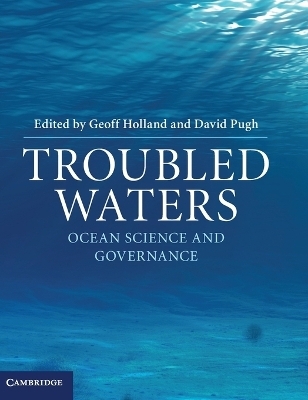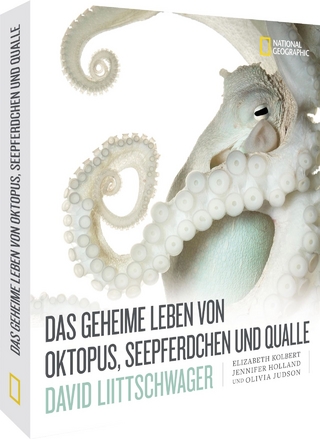
Troubled Waters
Cambridge University Press (Verlag)
978-0-521-76581-7 (ISBN)
Bringing together 30 international experts, this volume commemorates the 50th anniversary of the Intergovernmental Oceanographic Commission of UNESCO, the UN organization responsible for fostering intergovernmental cooperation on global ocean issues. It looks at how governments use science to establish ocean policies, with chapters ranging from the history of ocean management to current advances in marine science, observation and management applications, and the international agencies that co-ordinate this work. With a focus on key topical issues such as marine pollution, exploitation, and hazards, Troubled Waters reflects on past successes and failures in ocean management and emphasises the need for knowledge and effective government action to ensure a sustainable future for this precious resource. Illustrated with dramatic, full-colour images, it is essential reading for researchers, students, policy makers and managers of the marine environment, and also provides an attractive and accessible overview for anyone concerned about the future stewardship of our oceans.
Geoff Holland was awarded a BSc and MSc in Hydrodynamics and Aerodynamics from London University, before becoming a scientific officer for the UK Government Hydraulic Research Station in Wallingford (1957–67). He then emigrated to Canada and spent 32 years working in ocean science with the Canadian government, culminating with a position as Director General, Ocean Sciences and Services. During this time, he served on many national committees dealing with issues such as climate, energy, offshore resources, pollution, ocean data buoys and remote sensing. He was appointed Chairman of the International Maritime Organisation 1985–1989, overseeing the discussions leading to the ban on the ocean disposal of low-level radioactive waste. He was then made Chairman of the Intergovernmental Oceanographic Commission (IOC) 1995–1999. Mr Holland retired in 1999 and has since been appointed Canadian 'Ocean Ambassador' by the Minister for Fisheries and Oceans. David Pugh was awarded a PhD in Geodesy and Geophysics from the University of Cambridge in 1968 before joining the Proudman Oceanographic Laboratory in Merseyside. In 1984 he became Head of Oceanography, Hydrology and Meteorology, Science Division, for the UK National Environment Research Council. He has also served as Secretary to the United Kingdom Government Committee on Marine Science and Technology and was elected President of the IOC (2003–2007), having previously been the Founding Chairman of the IOC Global Sea Level network, GLOSS. Dr Pugh maintains an active program of research associated with Liverpool University and the Proudman Oceanographic Laboratory. His interests include tides, surges, mean sea level, coastal management and climate change, the economics of marine activities related to GDP, and the history of sea level, and he is the author of two other books. He received an award from the Queen in 2003 for his services to marine sciences.
List of contributors; Foreword HSH Prince Albert of Monaco; List of acronyms; Part I. Introduction Geoff Holland and David Pugh; Part II. The Global Context: 1. For the ocean Patricio Bernal; 2. The UN, science and ocean governance Alan Simcock; 3. UNCLOS and ocean science Elie Jarmache; 4. Fifty years of developing national marine skills Ehrlich Desa and Joannes Berque; 5. The early years of the IOC Desmond Scott and Geoff Holland; Part III. Oceans and Science: 6. Ocean science, an overview Gunnar Kullenberg; 7. Ocean climate programmes Allyn Clarke; 8. The international bathymetric chart Ron Macnab and Dmitri Travin; 9. Living marine resources Henrik Enevoldsen; 10. Non-governmental organizations Elizabeth Gross; Part IV. Observations and Data: 11. Ocean observations Peter Dexter and Colin Summerhayes; 12. Oceanographic data: from paper to pixels Iouri Oliounine and Peter Pissierssens; Part V. Applications: 13. Coastal zone management Laurence Mee; 14. Hazards and warnings David Pugh; 15. Caribbean co-operation Guillermo Garcia Montero; 16. Oceans, science and governments in Africa Justin Ahanhanzo and Geoff Brundrit; Part VI. Intergovernmental Agencies and Science: 17. The Food and Agriculture Organisation Ray Griffiths; 18. The International Hydrographic Organisation Hugo Gorziglia; 19. The International Maritime Organisation Andrea Garcia; 20. The United Nations Environment Programme Salif Diop and Jacqueline Alder; 21. The World Meteorological Organisation Peter Dexter and Yves Treglos; Part VII. The Future: 22. The future of oceans, science and governance Neville Smith; 23. Afterword Geoff Holland and David Pugh; Index.
| Erscheint lt. Verlag | 16.9.2010 |
|---|---|
| Zusatzinfo | 197 Halftones, color |
| Verlagsort | Cambridge |
| Sprache | englisch |
| Maße | 195 x 252 mm |
| Gewicht | 880 g |
| Themenwelt | Naturwissenschaften ► Biologie ► Limnologie / Meeresbiologie |
| Naturwissenschaften ► Biologie ► Ökologie / Naturschutz | |
| Naturwissenschaften ► Geowissenschaften ► Hydrologie / Ozeanografie | |
| ISBN-10 | 0-521-76581-1 / 0521765811 |
| ISBN-13 | 978-0-521-76581-7 / 9780521765817 |
| Zustand | Neuware |
| Haben Sie eine Frage zum Produkt? |
aus dem Bereich


